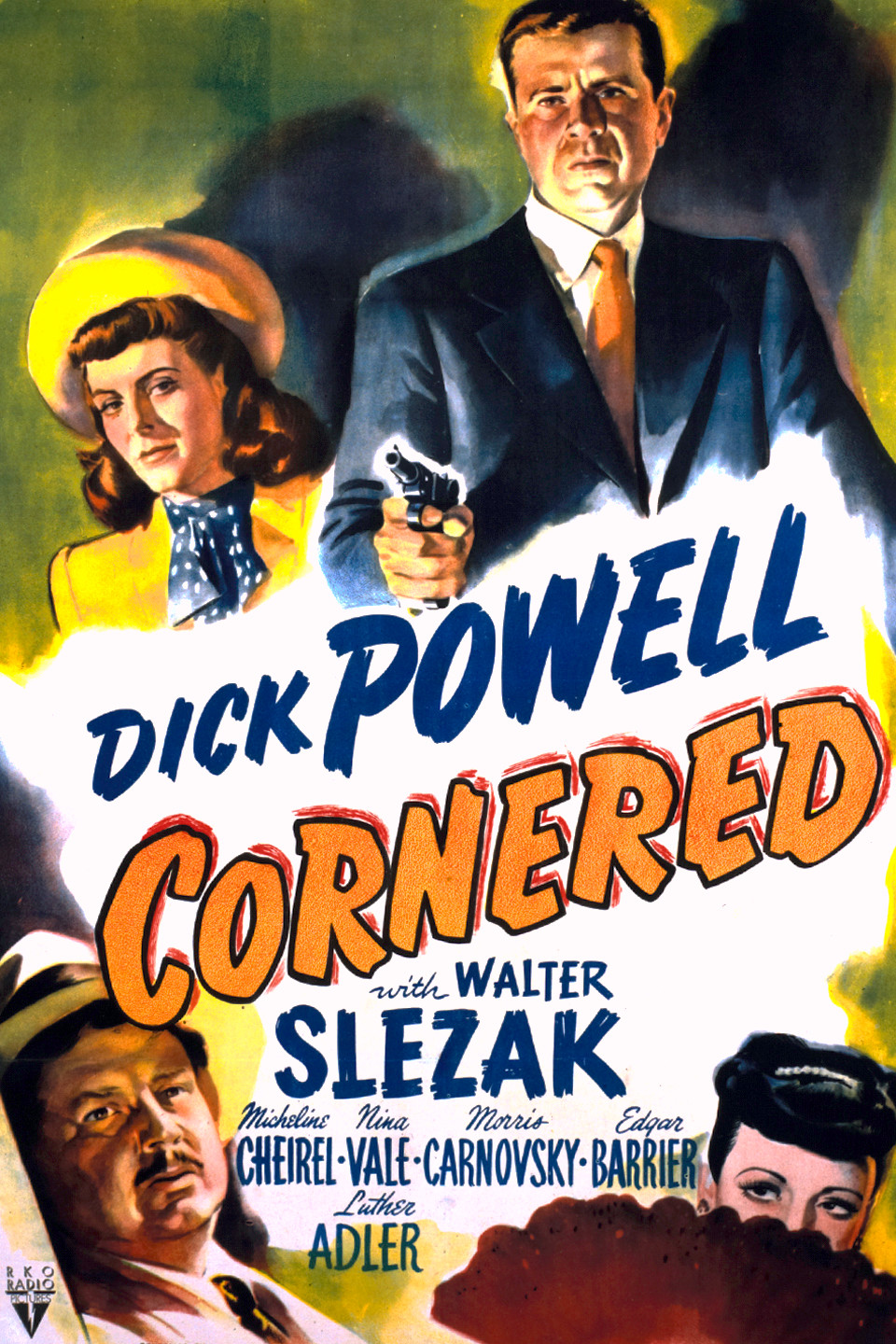CORNERED
(director: Edward Dmytryk; screenwriters: John Paxton/from an unpublished story by John Wexley; cinematographer: Harry J. Wild; editor: Joseph Noriega; music: Constantin Bakaleinikoff; cast: Dick Powell (Laurence Gerard), Walter Slezak (Melchior Incza), Micheline Cheirel (Mme. Jarnac), Nina Vale (Senora Camargo), Morris Carnovsky (Santana), Edgar Barrier (DuBois, Insurance Man), Steven Geray (Senor Camargo), Jack La Rue (Diego), Luther Adler (Marcel Jarnac), Gregory Gay (Perchon, Belgian banker); Runtime: 102; RKO; 1945)
“A humorless, no-nonsense revenge thriller directed by Edward Dmytryk…”
Reviewed by Dennis Schwartz
A humorless, no-nonsense revenge thriller directed by Edward Dmytryk and produced by Adrian Scott. “Cornered” had four people associated with the film who were blacklisted in the 1950s–Dmytryk, Scott, Carnovsky, and Adler. It should come as no surprise that a political diatribe against Fascism, which reflected the idealistic political views of the four blacklisted film people, would be a major part of the film. It might seem a dated argument now, but at the time it had relevance.
Dick Powell is Lieutenant Gerard, a hero Canadian pilot just released from a PoW camp. He flies out of London and returns to France to find out who killed his 20-year-old war bride of 20 days. Gerard learns it is a Vichy collaborator named Marcel Jarnac (Adler) and that there are official papers declaring him dead. Gerard is an impetuous, rough and tumble man, with a hot temper, and he doesn’t believe for a second Jarnac is dead. But no one knows what Jarnac looks like, all the witnesses who signed his death warrant are dead, and there’s no trace of him.
Dick Powell blurs his previous image as he proves he’s not just a crooner, but could act macho in a tough guy part.
Following a lead that Jarnac worked with a partner Gerard finds him dead in a fire with paper documents on him about the collaborators, that are almost completely burnt. But Gerard finds two addresses, one that leads him to a Swiss bank and another to Jarnac’s widow living in Buenos Aires under the address of a Tomas Camargo.
Getting off the plane in Buenos Aires Gerard’s met by a sleazy, obese man posing as a tour guide, Incza (Slezak), who takes him to a party of wealthy expatriates and Fascist sympathizers. Here Gerard meets Mr. and Mrs. Tomas Camargo, Mr. Dubois, Mr. Santana, Mrs. Jarnac, a hostile Belgium banker, and the waiter/valet Diego.
Gerard has no idea whom to trust, as he openly follows and threatens Mrs. Jarnac. This leads to his making an arrangement with the untrustworthy Incza to try and smoke Jarnac out through a deal with Tomas Camargo. But it turns out the insurance man Dubois, the lawyer Santana, and Diego are operatives trying to catch Jarnac and his gang of collaborators, as they hope to get evidence to prosecute them for war crimes. Because of Gerard’s unthinking manner of rushing right into danger, Diego is killed.
Gerard’s only aim is to get the killer of his wife and kill him, so he refuses to join the more cautious anti-Fascist group. By following Mrs. Jarnac he learns that she doesn’t even know who her husband is, as she never met him–it was an arranged proxy marriage by her collaborator father to get her and her injured sister out of France. Gerard is not sure whether to trust her or not when she asks for money to flee back to France, claiming she fears for her life here and has no money.
Warning: spoiler to follow in the next paragraph.
The final showdown comes when Incza sets up a meeting with Camargo to trade a paper Gerard claimed he had implicating Camargo in the Fascist conspiracy for the identity and whereabouts of Jarnac, but it’s a double-cross set-up by Jarnac. When Gerard goes to meet Camargo at a waterfront bar, the Belgium banker conks Gerard over the head with a gun and Jarnac comes out of a dark corner telling Gerard he’s going to kill him. When Incza enters the meeting, Jarnac shoots him for not bringing the papers. Through the quick action of Gerard, Incza turns the tables on the mysterious Jarnac and beats him to death. DuBois and Santana were called to the bar by Mrs. Jarnac and discover that Incza did indeed have the papers on him to incriminate the whole group. Just then the police arrive.
The film was excellently photographed by Wild, but without using the expressionistic devices found in many noir films. Instead the dark and shadowy photography captures the grim nature of the tale by showing how invisible the face of Fascism is.
The film’s most amusing line is a question Powell asks Slezac: “What are you French or German?” And Slezac responds. “No. I’m an epicure.”

REVIEWED ON 12/3/2001 GRADE: B +